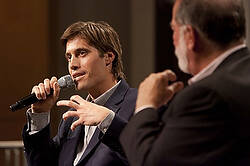At the Catholic Moral Theology blog, Nichole Flores remembers James Foley, the American journalist beheaded by ISIS terrorists. (It's so horrible to write those words. May God be with his family.)
"I did not know James Foley personally," writes Flores, "but as a Catholic educator, I feel like I know a lot of students like him: smart, idealistic, committed, and brave. In his story, I see the stories of so many of my students."
Foley graduated in 1996 from Marquette University and, as Flores notes, he was apparently deeply influenced by his Jesuit education. She notes:
Upon the news of Foley’s death, Marquette Magazine reposted a 2011 piece, “Phone call home,” where Foley reflects on the role his Marquette education played in his experience of political imprisonment in Libya. In this letter, Foley describes his transformation from a “sheltered kid” to someone who wanted to “give [his] heart for others.” In his narrative, he portrays Marquette as a good friend, “The kind who challenges you to do more and be better and ultimately shapes who you become.” This friendship, Foley explains, helped him become the kind of journalist—and person—who could face adversity that many try to avoid but that Christian discipleship promises: the experience of suffering for the Gospel.
Read the rest of Flores's post here.








